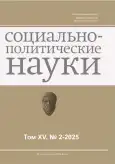The problem of understanding the essence of femininity in Western and Russian society
- Authors: Lagunova I.S.1
-
Affiliations:
- Nizhny Novgorod Linguistics State University named after N.A. Dobrolyubov
- Issue: Vol 15, No 2 (2025)
- Pages: 236-243
- Section: Esthetic
- URL: https://journal-vniispk.ru/2223-0092/article/view/296117
- DOI: https://doi.org/10.33693/2223-0092-2025-15-2-236-243
- EDN: https://elibrary.ru/OQYBBF
- ID: 296117
Cite item
Abstract
Interest in the specifics of female nature, the differences between “female” and “male” has existed at all times. In the 20th century, such interest was largely transformed into slogans and social transformations, movements for equal participation of women, along with men, in various social institutions and public administration. The XXI century marked a new wave of interest in the study of the topic of “femininity”. It is largely due to the fact that conditions for the active participation of women in various spheres of society have already been created, many women occupy leading positions in the management of social institutions and strive to unite, forming women’s clubs, women’s business communities, etc. Their creation is inherently connected with the understanding of the specifics of “femininity”. Also, the relevance of the study of the concept of “femininity” is related to the fact that the living conditions set by the scientific and technological progress of modern society have significantly increased the level of stress in human life, which has reflected on the multiplied problems of women’s health. The search for ways to restore it is increasingly going into the search for answers to the question of the foundations of health laid down by “feminine nature”. Having analyzed the change in the social role of women and the understanding of "femininity" in the course of the history of European and Russian societies, the author of the article offers his version of the content of this concept, which, in our opinion, can contribute to the formation of a deeper gender identity of a modern woman and an understanding of the basics of her health.
Keywords
Full Text
##article.viewOnOriginalSite##About the authors
Irina S. Lagunova
Nizhny Novgorod Linguistics State University named after N.A. Dobrolyubov
Author for correspondence.
Email: i.s.lagunova@yandex.ru
SPIN-code: 4172-1988
senior lecturer, vice-dean, Higher School of Social Sciences
Russian Federation, Nizhny NovgorodReferences
- Maslow A. Motivation and personality. 3rd ed. Moscow, 2022. 641 p.
- Plato. Collected works. In 4 vols. A.F. Losev (gen. ed.). Moscow: Mysl, 1990–1994.
- Pico della Mirandola G. Speech on the dignity of man. In: Aesthetics of the Renaissance. Anthology. In 2 vols. Vol. 1. V.P. Shestakov (comp. and author’s foreword). Moscow: Iskusstvo, 1981. Pp. 248–265.
- Rose Sh. Path of the priestess, path of the goddess. Moscow, 2007. Pp. 55–100.
- Rotterdamsky E. Praise of folly. Moscow, 2023. 224 p.
- Blessed Augustine. Confession. Moscow, 2024. 416 p.
- Brandt G.A. The nature of women as a problem (concepts of feminism). Social Sciences and Modernity. 1998. No. 2. 111 p. (In Rus.)
- Nietzsche F. Beyond good and evil. Moscow, 2024. 320 p.
- Biddy M. Women and modernity: The (life)styles of Lou Andreas-Salomé, Ithaca. Cornell University Press, 1991, p. 98
- Zetkin K. The intelligent proletariat, the women’s question, and socialism. (A report delivered at a public meeting in Berlin in January 1900). Petrograd, 1918. 36 p.
- Kollontai A.M. Society and motherhood. Moscow: State Publishing House, 1921. Pp. 200–210.
- Beauvoir S. de. The second half. Moscow, 2022. 928 p.
- Butler J. Gender trouble feminism and the subversion of identity. N.Y.: Routledge, 1990. 236 p.
- Foucault M. History of sexuality. Vol. 4: Confessions of the flesh. Moscow, 2020. 416 p.
- Irigaray L. Sex, which is not singular. In: Introduction to gender studies. I.A. Zherebkina (ed.). Kharkov; St. Petersburg, 2001. Part 2.
- Huber J. On the origin of the gender unequality. 1st ed. Routledge, 2007. 184 p. doi: 10.4324/9781315633114.
- Estes K.P. Women running with the wolves. The female archetype in myths and legends. Moscow, 2022. Pp. 20–180.
- Andelin H. The charm of femininity. Moscow, 2023. 272 p.
- Buslaev F.I. Ideal female characters of Ancient Rus’. In: Historical essays on Russian folk literature and art. Vol. 2. St. Petersburg, 1861. Pp. 262–292.
- Kostikova I.V. et al. Introduction to gender studies. 2nd ed. Moscow: Aspect Press, 2005. Pp. 16–17.
- Philosophical Dictionary. Moscow: Palimpsest; Eterna; Andre Comte-Sponville, 2012.
- Polunina A.G., Bryun E.A. Neuroanatomical features of the brain in men and women. Clinical Medicine. 2017. No. 3 (11). Pp. 68–75. (In Rus.). doi: 10.18454/ACEN.2017.3.10.
- Kapterev P.F. On the characteristic mental properties of women. 2nd lecture. Education. 1894. No. 5-6. (In Rus.)
- Regnerus M. How different are the adult children of parents who have same-sex relationships? Social Science Research. 2012. Vol. 41. Issue 4. doi: 10.1016/j.ssresearch.2012.03.009.
Supplementary files








